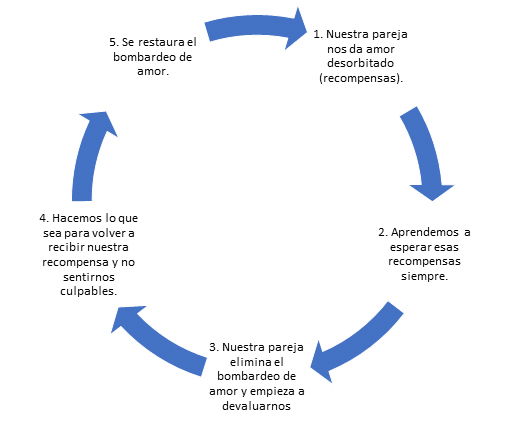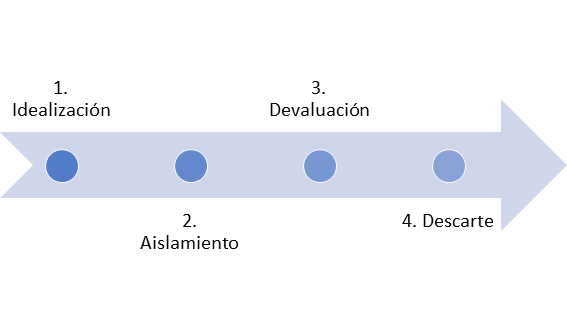
Laura began a relationship with Raul, a really nice guy who went out of his way for her since the very beginning. He was very detailed, gave her many gifts, entertained her with the most tender and romantic words that Laura had ever heard, they talked all the time and they had a lot in common. Although it seemed a bit exaggerated and fast, she thought that maybe Raul was a very passionate guy and it was not unusual that at the beginning of the relationship that intensified.
Soon after, they had a disagreement about what they were going to do for the weekend, since Laura had two commitments with her friends and they were not going to be able to see each other. Raul got upset and ignored Laura for days. There were no more constant messages about how much he loved her, how much she was worth or how beautiful she was. Laura, desperate not to disappoint Raul, gave in and opted to cancel her plans. Raul was back to his old self…but only for a while.
All that glitters is not gold
Love bombing is a form of psychological manipulation in which one member of the relationship gives excessive and overwhelming attention and love to the other, and then withdraws it as a punishment if their partner does not act as they want, in order to control them.
In this way, the partner learns to expect the bombardment of love, as if it were a reward. This is used as a way of emotionally blackmailing the other, making them feel guilty: “As generous as my partner has been, if something goes wrong, it’s my fault. I haven’t done half as much for her.” This bombardment occurs from the beginning of the relationship, abruptly and quickly.
Over time, this situation becomes cyclical, with love bombing being used only when it is believed that the partner is lost.
Doped with love, yes; love bombing, no.
Let’s take this opportunity to clarify the difference between love bombing and the euphoria we feel in the first stage of a relationship, which is influenced by a whole arsenal of hormones and neurotransmitters that cause us to act in a somewhat disproportionate way.
So, we ask ourselves, how do I distinguish between a phase of healthy infatuation and love bombing?
Well, the reality is that it is not always easy to discern these behaviors. Mainly because Hollywood sells us that love bombing behaviors are normal and desirable in a relationship; so we could say that we expect it.
In healthy relationships, love comes in several phases, so the infatuation phase is not eternal. In the infatuation or “honeymoon” phase, we could say that we wear rose-colored glasses with which we tend to idealize the partner and only see the good in him or her. In this phase, we tend to go in unison with our partner, so we feel that we are the ones who set the speed at which we go.
However, in the case of love bombardment, it is not uncommon for the person to feel overwhelmed by the speed and intensity at which the love gestures occur. It is normal to want to see or communicate with the person we are interested in; however, if these gestures become overwhelming, it may be an indicator that one is a victim of love bombing.
The main difference is the objective with which this overflowing manifestation of love is given (although it can be given unconsciously). This bombardment is given in order to change the actions of the other person and thus get him/her hooked on the relationship.
It is important to be attentive to possible red flags that we can see from the beginning of the relationship and not act under pressure from the other person.
Narcissistic profile: the expert bombers
Love bombing has a lot to do with narcissistic traits and low self-esteem.
The overflowing expression of love is all about validation. Validation that one is wanted, loved, valued, etc.
Did you know that love bombing was first seen in the 60’s in religious sects? Yes, in the end, the objective is no different than it is in a relationship: to seduce and make you never want to leave.
Before going into the narcissistic profile, it is worth clarifying that it is not the same to show narcissistic traits as to have a narcissistic personality disorder.
Some of the most characteristic features of a narcissistic profile are: lack of empathy, failure to take responsibility, defensive or victimizing attitude in the face of criticism, attention seeking and grandiose attitude. We can highlight mainly the need to feel important and/or special.
They are people who use others for their own benefit and even like to control others. However, it is not possible to do any of these things without manipulating the other; that is why they know how to sell themselves very well.
Thus, let’s see how a person with a narcissistic profile establishes a relationship:
1. The narcissist starts the relationship precisely with love bombing, with the objective that his/her partner idealizes him/her.
To do this, he/she will try to make his/her partner feel that he/she is the most special and important person for him/her.
Some examples that may help to identify it:
- Behavior completely disproportionate to the connection: for example, saying “I love you” after only a few days or hints of commitment.
- Quick intimacy: acts such as introducing their family right away, wanting to meet your family, wanting to start living together, etc. It is common for the narcissistic person to tend to share a negative aspect of their past in order to victimize themselves and create empathy, causing their partner to do the same and thus, gain information they can use in the future.
- Overwhelming compliments: almost as if they are trying to boost their partner’s self-esteem, they put them on a pedestal (and then treat them poorly). “You’re the best thing that’s ever happened to me,” “I’ve never met anyone as X as you,” “I can’t imagine a life without you”….
- Too many gifts. At all hours and for no apparent reason. Details in every activity, meeting or even conversation.
- Constant communication and attention: writing several times a day, making time to meet your partner, etc. Often, they are even “suffocating”.
- Mirror technique: shows excessive affinity to everything your partner likes. Same tastes, same hobbies, same interests, same objectives.
2. Then he or she will begin to demand more attention. This will cause their partner, little by little, to increasingly limit his or her solitary activities (isolating).
3. It is then, when he/she has his/her partner already “trapped”, when the person with a narcissistic profile starts to show their true face and the problems begin. Every time he/she does not feel that he/she is the center of attention or that his/her needs are not given priority, he/she will start the string of manipulative behaviors: intermittent reinforcement (now I listen to you and now I don’t, for example), gaslighting, humiliation or triangulation (manipulation of the partner through the relationship with a third person), among others.
This phase is characterized by psychological and emotional violence with the aim of ridiculing, humiliating, ignoring, disqualifying, intimidating and blackmailing the partner.
Only when faced with the fear of losing their partner, if it occurs, the love bombing is reinstated.
4. In this type of relationship, the narcissist ends up abandoning his partner when he has another one secured. It is not uncommon that they commit infidelities and that after the breakup they show no regret or empathy for their now ex-partner.
This string of behaviors has the consequence of creating dependency in the partner, undermining their self-esteem, making them doubt their judgment and generating anxiety, depression and guilt among others.
Discerning a person who manipulates us is not always easy.
If you need help and you think you are or have been a victim of love bombing, ask for an appointment.
Júlia Tarancón Estades
Psychologist Col. No B-3232










